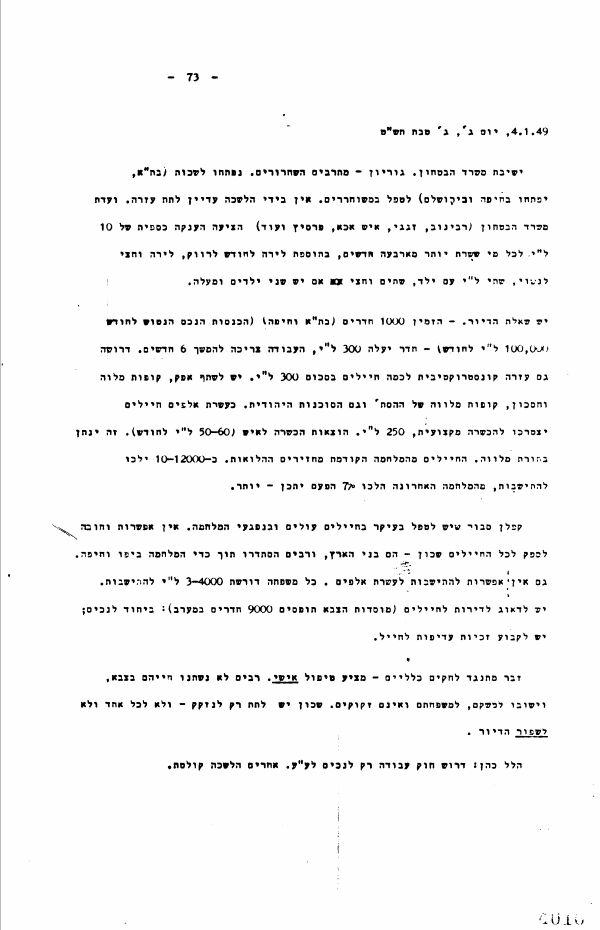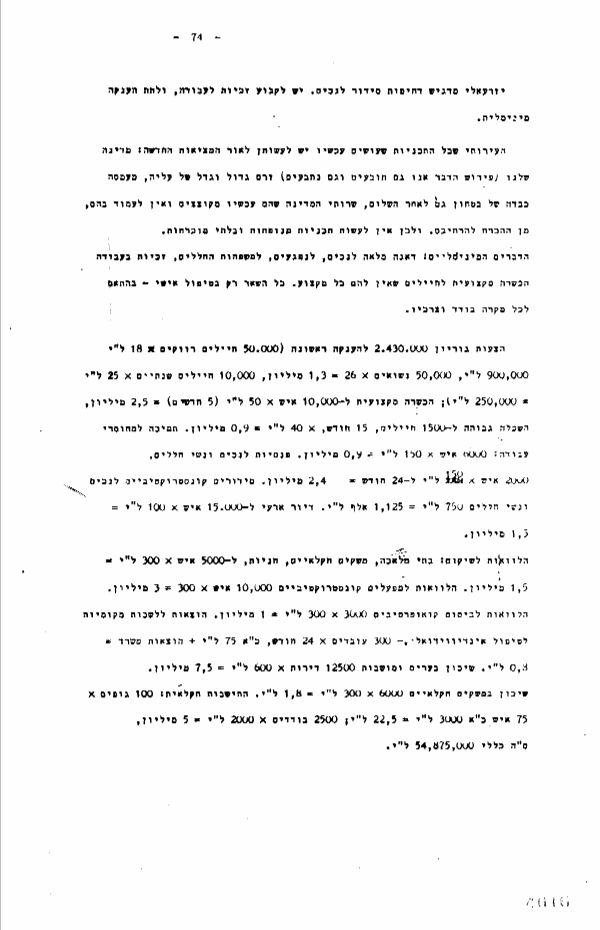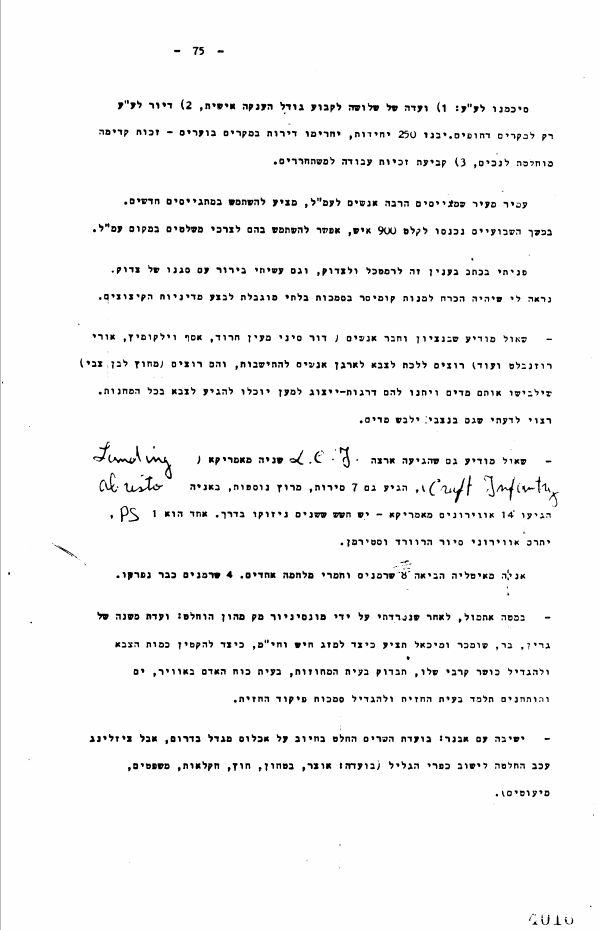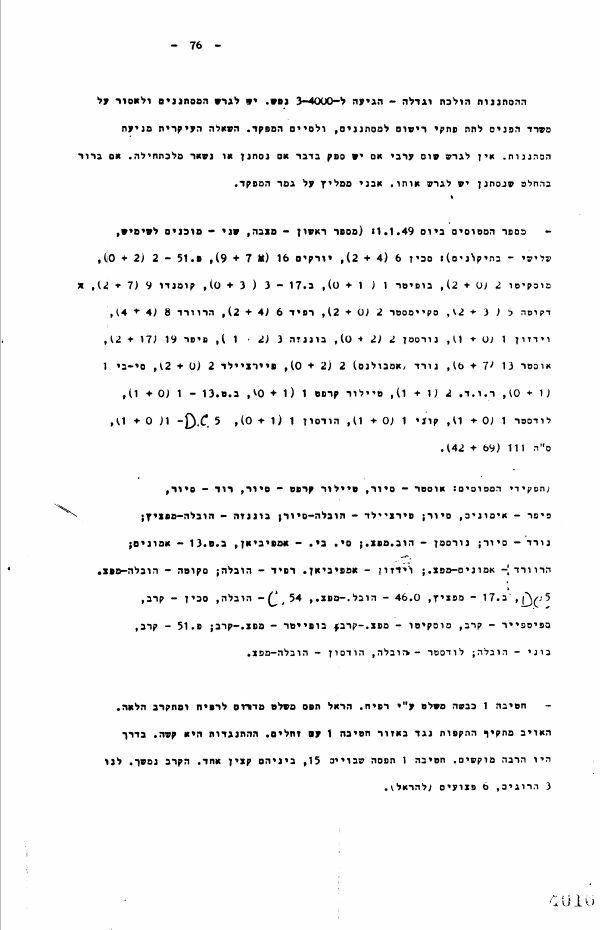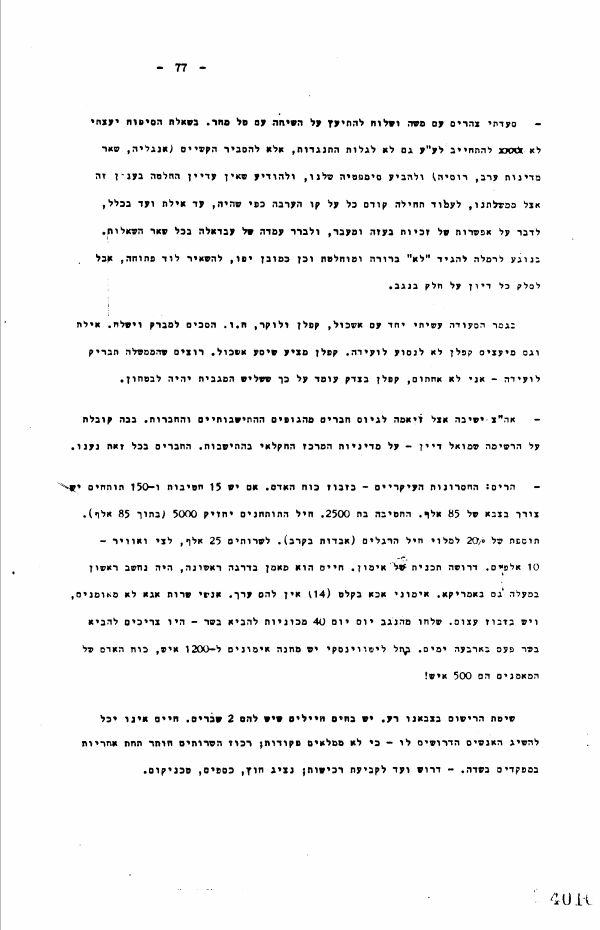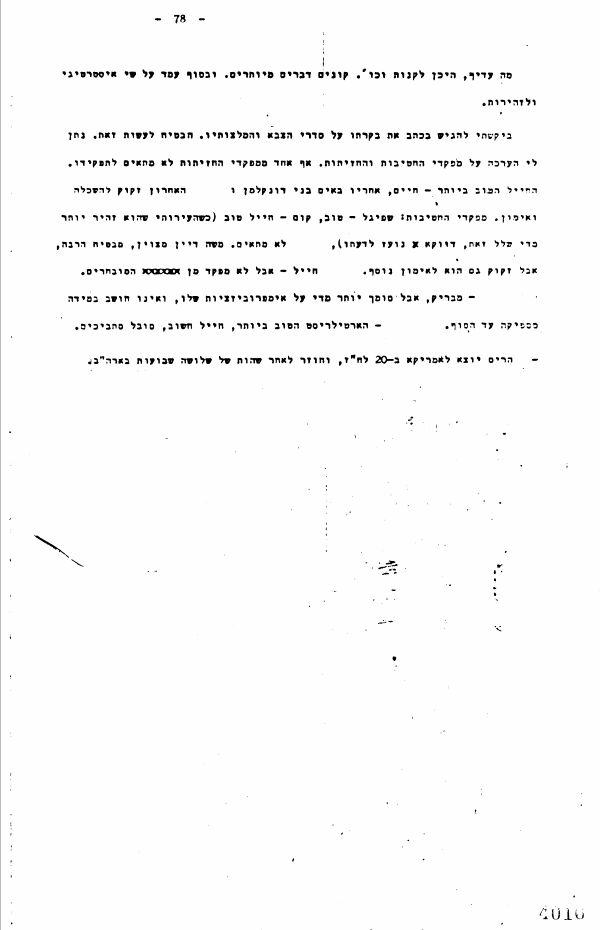Tuesday, January 4, 1949
Defense Ministry meeting. [Yosef] Gurion - discharges are increasing. Bureaus have opened (in Tel Aviv, [and] will open in Haifa and Jerusalem) to handle those being discharged. The bureau still doesn't have the means to provide assistance. A committee of the Defense Ministry ([Baruch] Rabinov, [Mordechai] Zagagi, someone from the Personnel Department, [Akiva] Persitz, and others) proposed a financial grant of P£ 10 for anyone who served more than four months, with an additional P£ 1 per month if unmarried, P£ 1.5 if married, P£ 2 [if married] with the child, 2½ if there are two or more children.
There's the question of housing. He requested 1,000 rooms (in Tel Aviv and Haifa) (the income from abandoned property is P£ 100,000 per month) - a room will cost P£ 300, the work [of transforming abandoned properties into apartments] should take 6 months. For some soldiers, constructive assistance is also needed in the amount of P£ 30. [We] need to include the APC [the Anglo-Palestine Company, predecessor of Bank Leumi], savings and loan funds, [and] Histadrut and Jewish Agency loan funds. About 10,000 soldiers will need vocational training, at P£ 250 training expenses per person (P£ 50-60 per month). This will be provided in the form of a loan. The soldiers from the previous war [World War II] are repaying their loans. About 10,000-12,000 will join the settlement enterprise; from the previous war [World War II] 7% joined, this time possibly - more.
[Eliezer] Kaplan thinks that care should be provided primarily for immigrant soldiers and war afflicted. It's not possible or necessary to provide housing for all the soldiers - they're inhabitants of the country, and many managed during the war in Jaffa and Haifa. Nor is it possible to settle 10,000. Each family requires P£ 3,000-4,000 for settlement. [We] need to ensure apartments for soldiers (army agencies occupy 9,000 rooms in the cities), especially for disabled; preferential rights should be granted to the soldier.
[Avraham] Zabar [Zabrasky?] is opposed to general rules - suggests individual care. For many of them, their lives didn't change in the army, and they will return to their settlements, their families, and are not in need. Housing should only be given to someone in need - and not to everyone and not in order to upgrade housing.
Hillel Cohen: For now a labor law is needed only for the disabled. Others are handled by the bureau.
[Yosef] Yizraeli stresses the urgency of an arrangement for the disabled. Employment rights should be established and a minimal grant provided.
I commented that all the plans being made now should be made in light of the new reality: a state of our own (meaning: we both demand and are demanded of); a large and growing influx of immigrants; the heavy defense burden even after peace; state services, which are currently being cut and cannot be met, will have to be expanded. And therefore overblown and unnecessary plans should not be made. The minimal things are: complete care for the disabled, for the afflicted, for families of the fallen, employment rights, vocational training for soldiers who do not have a vocation. All the rest will only be handled individually - according to each case and its needs.
Gurion's proposals [for the rehabilitation of discharged soldiers:] 2,430,000 for a first grant (50,000 unmarried soldiers x P£ 18 [=] P£ 900,000, 50,000 married x 26 = 1.3 million, 10,000 soldiers yearly [?] x P£ 25 = P£ 250,000); vocational training for 10,000 men x P£ 50 (five months) = 2.5 million, higher education for 1,500 soldiers, 15 months x P£ 40 = 0.9 million. Support for the unemployed: 6,000 persons x P£ 150 = 0.9 million. Pensions for the disabled and wives of the fallen, 2,000 persons x P£ 150 for 24 months = 2.4 million. Constructive arrangements for the disabled and wives of the fallen P£ 750 = P£ 1,125 thousand. Temporary housing for 15,000 persons x P£ 100 = 1.5 million.
Loans for rehabilitation: workshops, agricultural settlements, shops [?], for 5,000 persons x P£ 300 = 1.5 million. Loans for constructive factories 10,000 persons x 300 = 3 million. Loans to establish cooperatives 3,000 x P£ 300 = 1 million. Expenses for local bureaus to handle individual cases - 300 employees x 24 months, each P£ 75 + office expenses = P£ 0.8. Housing in cities and moshavot [rural communities of private farms] 12,500 apartments x P£ 600 = 7.5 million. Housing in agricultural settlements 6,000 x P£ 300 = P£ 1.8. Agricultural settlement: 100 bodies x 75 persons each P£ 3,000 = P£ 22.5; 2,500 individuals x P£ 2,000 = 5 million, overall total P£ 54,875,000.
We concluded for now: 1) A committee of three to determine the size of the individual grant, 2) Housing only for urgent cases, for now. 250 units will be built, apartments will be appropriated in the urgent cases - absolute priority for the disabled, 3) The determination of employment rights for those discharged.
[Yisrael] Amir comments that many are being recruited for AMAL; he proposes using new recruits [for work]. Over the course of two weeks, 900 men were received at intake; they can be used for the needs of strongholds in place of AMAL.
I wrote to the chief of staff and Zadok regarding this matter, and I also consulted with Zadok's deputy. It seems to me that it will be necessary to appoint a commissioner of unlimited authority to carry out a policy of [budget] cuts.
- Shaul [Avigur] reports that Ben-Zion [Israeli] and a group of men ([Ze'ev] Dorsini [sp.] from ''Ein Harod, Assaf Vilkomitz [Ami Assaf], Uri Rosenbluth [sp.], and others) want to go to the army to organize people for settlement, and (except for Ben-Zvi [should be: Ben-Zion]) they want to be provided with uniforms and given acting ranks, so that they can enter all the army camps. In my view Ben-Zvi [Ben-Zion] should also wear a uniform.
Shaul [Avigur] also reports that a second LCI [Landing Craft Infantry] arrived from America, [and] 7 additional strike-force boats [?] arrived as well. 14 airplanes arrived from America on the ship Abristo - there is concern that two were damaged en route. One is a P-51. The rest are Harvard and Stearman planes.
A ship from Italy brought 8 Sherman [tanks] and other combat material. 4 Shermans have already been unloaded.
- At the [General] Staff yesterday, after I was interrupted by Monsignor McMahon, it was decided: a subcommittee comprising [Monty] Green, [Yisrael] Ber, [Max] Schumacher, and Michael [Michael] will propose how to merge Hayish and garrison, how to decrease the size of the army and increase its combat capability; it will examine the problem of the districts, the problem of personnel in the Air [Force], Navy, and Artillery Corps: it will study the problem of the front and increase the front command's authority.
- Meeting with [Elimelech] Avner: the ministerial committee [for evacuation and population placement] reached an affirmative decision on the populating of Majdal [Migdal Ashkelon] in the south, but [Aharon] Zisling delayed the decision on settling the Galilee villages (on the committee: Finance, Defense, Foreign [Affairs], Agriculture, Justice, Minorities).
Infiltration is continuously increasing - it reached 3,000-4,000 persons. The infiltrators should be expelled, and the Ministry of the Interior prohibited from granting registration certificates to infiltrators, and the census should be concluded. The main question - preventing infiltration. No Arab should be expelled, if there's any doubt as to whether he infiltrated or remained from the outset. If it is absolutely clear that he infiltrated, he should be expelled. Avner recommends finishing the census.
Number of aircraft on January 1, 1949: (first number - inventory, second - ready for use, third - under repair): Knife [Messerschmitt] 6 (4+2), Spits [Spitfires] 16 (7+9), P-51 [Mustang] - 2 (2+0), Mosquito 2 (0+2), Beaufighter 1 (1+0), B-17 - 3 (3+0), Commando 9 (7+2), Dakota 5 (3+2), Skymaster 2 (0+2), Rapid 6 (4+2), Harvard 8 (4+4), Widgeon [?] 1 (0+1), Norseman 2 (2+0), Bonanza 3 (2+1), Piper 19 (17+2), Auster 13 (7 + 6), Nord [?] (ambulance) 2 (2+0), Fairchild 2 (0+2), CB [?] 1 (1+0), RWD [?] 2 (1+1), Taylorcraft 1 (1+0), BT-13 - 1 (0+1), Lodestar 1 (0+1), Connie [Constellation?] 1 (0+1), Hudson 1 (1+0), DC-5 - 1 (0+1), total 111 (69+42).
The role of the aircraft: Auster - reconnaissance, Taylorcraft - reconnaissance, RWD [?] - reconnaissance, Piper - training, reconnaissance; Fairchild - cargo-reconnaissance; Bonanza - cargo-bomber; Nord [?] - reconnaissance; Norseman - cargo-bomber; CB [?] - Amphibian, BT-13 - training; Harvard - training-bomber, Widgeon [?] - amphibian. Rapid - cargo; Dakota - cargo-bomber, DC-5, B-17 - bomber, 46.0 - cargo-bomber, C-54 - cargo, Knife - fighter, Spitfire - fighter, Mosquito - fighter-bomber, Beaufighter - fighter-bomber; P-51 - fighter, Connie [?] - cargo; Lodestar - cargo, Hudson - cargo-bomber.
- Brigade 1 captured a stronghold near Rafiah. Harel seized a stronghold south of Rafiah and is advancing onward. The enemy is counter-attacking around Brigade 1, with half-tracks. The resistance is fierce. Along the way there were many mines. Brigade 1 captured 15 POWs, including one officer. The fighting continues. We have 3 killed, 6 wounded (in Harel).
- I lunched with Moshe [Sharett] and Reuven [Shiloah] to consult on the conversation with al-Tall tomorrow. On the question of annexation [of the West Bank to Transjordan], I advised not to commit for now, nor to express opposition, but to explain the difficulties (England, the other Arab states, Russia) and to voice our sympathy, and to explain that our government has not yet made a decision on this matter; to insist first of all on the ''Arava line [borderline] as it stood, up to and including Eilat; to discuss the possibility of rights in Gaza and passage [to it], and to clarify Abdallah's position on all the other questions. Regarding Ramle, to voice a clear and absolute "no" and likewise of course Jaffa, to leave [the question of] Lod open, but to dispel any discussion on part of the Negev.
After the meal I went [back to the General Staff] along with Levi [Eshkol], [Eliezer] Kaplan, and [Berl] Locker. Chaim Weizmann assented to the cable [regarding the United Jewish Appeal] and it will be sent. [Eliahu] Elath and [Oscar] Gass are advising Kaplan not to travel to the conference. Kaplan suggests that Eshkol go. They want the government to cable the conference. I won't sign it; Kaplan rightly insists that a third of the funding go to defense.
- In the afternoon a meeting at Ziama [Aran]'s to recruit members of the settlement bodies and the companies. Bebe [Idelson] complains about the list [to the Knesset], Shmuel Dayan - about the policy of the Agricultural Center on settlement. The members acceded nonetheless.
- [Fred] Harris: The main shortcomings - waste of manpower. If there are 15 brigades and 150 cannons, the army should be 85,000. The brigade is 2,500. Artillery Corps will maintain 5,000 (of the 85,000). An addition of 20% to fill infantry (battle losses). For the services 25,000, for the Navy and Air [Force] - 10,000. [We] need a training program. Haim [Laskov] is a top-tier trainer, was viewed as of the highest caliber in America as well. The Personnel Department training during intake (14 [days]) is worthless. The Logistics Department service personnel are untrained, and there is tremendous waste. They sent 40 vehicles from the Negev every day to bring meat - they should have brought meat once every four days. Tel Litvinsky has a training camp for 1,200 men; the manpower of the trainers is 500 men!
The registration system in our army is bad. There are soldiers in garrison who have 2 fractures [?]. Haim is unable to get the men he needs - because orders aren't being fulfilled; the concentration of services undermines the responsibility of the commanders in the field.
A committee is needed to determine procurements; representative[s] of [the] Foreign [Ministry], finances, Technicom [Technion], what's preferable, where to buy, etc. Superfluous things are being bought. And finally he spoke about a strategic SHAI [intelligence service] and caution [field security].
I asked that he submit his critique of army arrangements, and his recommendations, in writing. He promised to do so. He gave me an assessment of the brigade and front commanders. None of the front commanders is suited to his role. The best soldier is Haim [Laskov], followed by Benny Dunkelman and Motke [Makleff], the latter needs education and training. Brigade commanders: [Nahum Golan] Spiegel is good, Koch [Shimon Avidan] is a good soldier (when I commented that he's too cautious, he disputed this. He's actually daring, in his opinion), [Yitzhak] Pundak is unsuited. Moshe Dayan is excellent, very promising, but also needs additional training. James [Ben-Gal] is a soldier - but not one of the select commanders. Yigael Yadin is brilliant, but relies too much on his improvisations, and doesn't think things through to the end sufficiently. Fritz Eshet is the best artilleryman, an important soldier, suffers from complexes.
Harris is leaving for America on the 20th of this month, and will return after a three-week stay in the United States.





